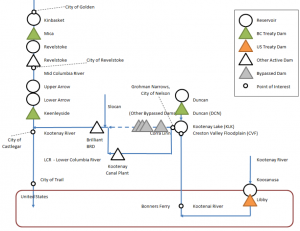
Project Description
Columbia River Treaty Review – BC Stakeholder Values – Exploring stakeholder priorities for Treaty discussions
The Columbia River Treaty is a transboundary water agreement between Canada and the U.S. that governs the joint management of the Columbia River. Its primary purpose is to coordinate flood control and optimize electrical energy production. Under the terms of the agreement, as of 2014, either party can terminate the agreement with ten years notice. In 2014, the BC Ministry of Energy and Mines conducted an analysis of the economic, environmental, social, financial, legal and hydrological impacts of the Columbia River Treaty in order to make an informed decision on continuation, amendment or termination of the Treaty.
As part of its assistance to the Province in this work, BC Hydro engaged Compass to explore how potential Treaty scenarios might affect stakeholder values and priorities. In this role, we co-developed and refined a range of environmental and social performance measures that reflected a range of stakeholder values for both the Kootenay and Columbia Rivers. We calculated the performance of these measures over various modeled water management alternatives, summarized key messages in plain language for a public audience, and developed visualization tools to help stakeholders better understand key value-based trade-offs. As part of the work, we designed and facilitated a structured process with a Columbia River Treaty Fish and Wildlife Committee, and facilitated a range of public and First Nations engagement meetings.

Related Projects: Water, Fish and Wildlife, Infrastructure, Cumulative Effects, Transboundary Negotiations, Decision Support Tools, Structured Decision Making
Project Details
- ClientBC Ministry of Energy and Mines


